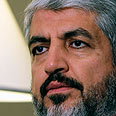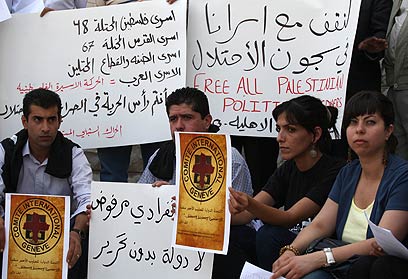

A senior Hamas official warned Monday that Israel's continued refusal to elasticize its position regarding the Shalit prisoner deal will only fuel Hamas' "need" for the abduction of more Israeli soldiers, to be use as bargaining chips.
"More of Shalit's kind are coming," Hamas lawmaker Ismail al-Ashqar vowed, adding that the "efforts to kidnap soldiers will continue until all Palestinian prisoners are freed."
Related stories:
- German mediator visits Cairo to renew Shalit deal
- Panetta: Israel becoming increasingly isolated in ME
- Report: Israel compromises on demands in Shalit deal
He said that Israel's refusal to meet Hamas' demands will not prompt the group to "bow to Israeli pressure"; and reiterated that the demands made in exchange for the captive soldier were nonnegotiable.
Gilad Shalit was abducted by Gaza terrorists in June 2006. Hamas is seeking the release of more than 1,000 Palestinian prisoners in return for his freedom; including some who Israel considers an extreme threat to public safety – and therefore is refusing to include them in any such prisoner exchange.
Israel and Hamas' differences on the Shalit deal have often been described as "unbridgeable," as talks have stalled time and again. Egypt's Al-Ahram newspaper reported Monday that German mediator Gerhard Conrad was in Cairo once again, to try and broker a breakthrough that would secure the release of the captive soldier.
'We'll fight for prisoners' release'
Hamas' warning of future abductions came as more Palestinian prisoners announced they would be joining the hunger strike declared be some security prisoners five days ago, in protest of the solitary confinement imposed on some of them.

Support rally for striking prisoners (Photo: EPA)
Thousands of Palestinians in the West Bank and Gaza staged demonstrations on Monday in solidarity with the prisoners; with the biggest rally numbering 2,000 people, who gathered outside the Red Cross office in Nablus.
In Gaza City, 1,000 people demonstrated outside the local Red Cross headquarters.
Hamas leaders addressed the crowd in Gaza and vowed that Gilad Shalit would not be freed until all Palestinian prisoners were released."We assure our courageous prisoners that the day of liberation approaches and that Shalit will not taste freedom or see the light until our prisoners have been released safe and sound," al-Ashqar said.
Issa Qaraqea, the Palestinian prisoners minister, said last Wednesday that roughly 6,000 Palestinian prisoners – virtually the entire Palestinian prisoner population – were joining the hunger strike; but revised that statement to "hundreds" on Monday.
Qaraqea said that some 500 prisoners were now partaking in the strike, but Israel Prisons Service Spokeswoman Sivan Weizman said that so far only 160 prisoners were noted as observing a hunger strike.
"They are all under medical supervision and none is in danger," she said, adding that they were all drinking water.
In June, as Shalit marked his fifth year in Hamas captivity, Prime Minister Benjamin Netanyahu announced that Palestinian prisoners' rights would be curbed until Shalit was released.
Following the decision, privileges such as access to books, educational programs and family visits were suspended.
Hamas leaders hailed the Palestinian prisoners' decision to go on a hunger strike and vowed to fight for their release.
In a statement, Hamas said it "holds Israel fully responsible for the lives and safety of the prisoners," adding that it was "Israel’s abuses against those held in Israeli prisons that has inspired the hunger strike."
A second statement by Hamas’ Change and Reform parliamentary bloc said that the hunger strike was "evidence of the cruelty faced by the prisoners in the Israeli prisons," as well as "an expression of the strength of the prisoners’ will power and defiance of the prison administrations."
Hamas further urged the Palestinian street to support the prisoners' strike. Abdullah Qindil of Gaza's Waed prisoner rights organization said that "all forms of support for the prisoners have become a religious, national, moral, and humanitarian duty," for the Palestinian people.
Reuters and AFP contributed to this report
- Follow Ynetnews on Facebook
- Receive Ynetnews updates
directly to your desktop















